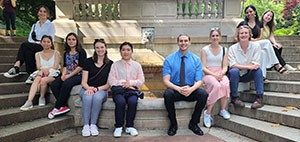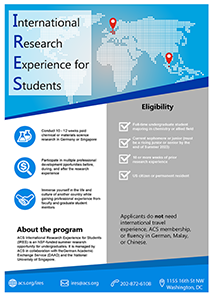ACS International Research Experience for Students (IRES) Program
Fellowship at a Glance
IRES is on hiatus for 2024
If you are interested in summer research in Germany, you are encouraged to apply directly to the DAAD RISE program.
Otherwise, please check back in Fall 2024 for 2025 opportunities.
Purpose
Provide fully-funded opportunities for undergraduates to conduct research in either Germany or Singapore.
Description
The IRES program includes the following activities:
- Pre-departure orientation: IRES participants will travel to ACS headquarters in Washington, DC, for 3-4 days in the spring. Participants will have the opportunity to meet eminent scientists, prepare for the summer experience, develop their professional skills, and connect with the other members of the cohort.
- Summer research: 10-12 weeks of summer research at either the National University of Singapore (NUS) or one of the institutions in the German Academic Exchange Service (DAAD) network. Participants prepare a technical report and receive feedback from ACS journal editors. Participants also write an experiential report for inChemistry magazine.
- Participation in the ACS Spring Meeting: IRES participants will present their research at the ACS spring meeting and participate in student-focused programming.
IRES funding covers:
- Airfare, housing, and food during travel to the orientation and the ACS meeting
- Travel to Germany or Singapore, plus $5,000 living stipend, $1,800 housing allotment, and medical insurance while overseas
- Up to $300 for optional language lessons
- 1 year ACS premium student membership
IRES will help you sharpen your scientific skills, develop collaborations with international scientists, and experience the life and culture of a foreign country.
Eligibility
To be considered, IRES applicants must meet the following requirements:
- US citizen or permanent resident
- Current sophomore or junior at a college or university in the United States, with plans to continue as a junior or senior next fall (students currently enrolled in two-year college must show that they will be transferring to a four-year program no later than Fall 2023)
- Major in chemistry, biochemistry, chemical engineering, or materials science
- Minimum 10 weeks or 400 hours prior research experience
A minimum GPA of 3.4 is preferred but not required. All host labs communicate in English, and there is no additional language requirement. You do not need prior international experience or ACS membership to apply.
How to Apply
Only complete applications will be considered for positions in either Germany or Singapore.
IRES in Germany
Research in Germany is managed by the German Academic Exchange Service (DAAD) RISE Program. Students apply to DAAD RISE and indicate their interest in the ACS IRES program in their motivation letters (see below).
Applicants will need to provide
- Motivation letter for each DAAD project of interest (indicate interest in IRES prorgam as part of the letter)
- Resume or curriculum vitae (CV)
- Official transcript
- List of courses that are not currently on the transcript, but which you will have completed by Summer 2023
- Verification from the university/certificate of enrollment (form provided)
- Letter of reference
Up to 8 RISE students will be selected for the additional benefits of the IRES program.
Questions about the DAAD application? Visit the DAAD FAQ page.
IRES in Singapore
Research in Singapore is conducted at the National University of Singapore (NUS). Students may apply for one or more of the following projects:
- Precision Synthesis of Dynamic Functional Materials, Dr QIU Yunyan
This research blends synthetic, organometallic, supramolecular, catalytic, and polymer chemistry to generate a variety of functional materials and solve fundamental problems in materials science and sustainability by harnessing porous frameworks and polymer networks. Student project will focus on organic synthesis and precision polymer synthesis, as well as mechanical properties of synthesized materials. - Detecting microplastic particles in food packages, Dr. Suresh VALIYAVEETTIL
This project will analyze processed foods to isolate and quantify plastic microparticles present in the food. Spectroscopic and microscopic methods will be used to identify the microplastics present, and additional techniques may be needed to identify plastic particles with no spectroscopic signatures.
Applicants will need to provide:
- Unofficial transcript (official transcript will be required upon acceptance to the program)
- List of courses that are not currently on the transcript, but which you will have completed by Summer 2023
- Statement of interest in the program and preferred position(s)
- Resume or curriculum vitae (CV)
- Two letters of recommendation
One student will be selected for each project.
Evaluation process
All of the Singapore applications, plus a list of RISE students, are reviewed by a panel of faculty and scientists familiar with the international landscape. Applicants will be considered based on
- Academic performance
- Enthusiasm for international collaboration
- Potential to both contribute to and benefit from independent research
- Likelihood to benefit from the ACS IRES program in particular (over other international opportunities).
A total of 10-12 students will be selected for the IRES program.
Acceptance letters will go out in late February or early March 2023. All applicants will be informed of their status by March 31, 2023.



